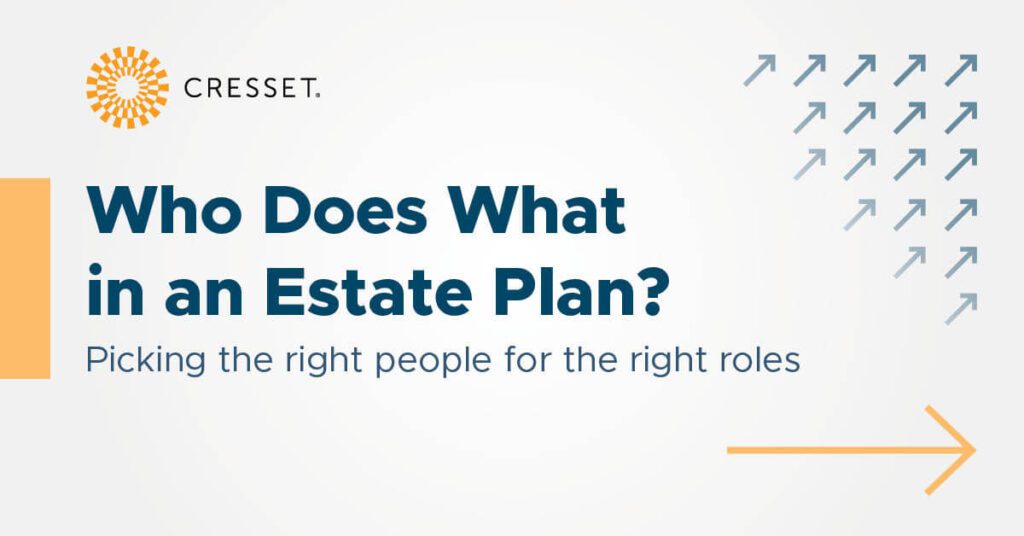
Picking the right people for the right roles
When creating or updating an estate plan, there are a variety of critical roles to consider. And who you choose to fill those roles can and will evolve as life changes inevitably happen (births, deaths, marriages, divorces, etc.).
The following is a list of the most common roles involved with core estate documents, what the responsibilities entail, and important questions to ask before selecting people in your life to fill those roles.
Roles to Consider
Executor
The Executor (sometimes called Personal Representative) is the person responsible for administering an estate, including probating a will, collecting a decedent’s assets, paying final bills, and filing final tax returns. The Executor may, but need not, be the same person as your Successor Trustee.
- Does this person have the experience, skill, and maturity to manage my financial affairs?
- Does this person have the time to serve as a fiduciary?
- How old is this person, and will they be living when I may need them?
- What kind of response will my family have to this person being named?
Trustee
The Trustee is responsible for the administration and/or investment management of trust assets. For a revocable trust, the grantor – the person creating the trust – may serve as trustee during their lifetime. Upon the Grantor’s incapacity or death, a Successor Trustee of your choosing will step in and act as Trustee. You may name more than one Successor Trustee or appoint several people to act together as Co-Trustees.
- Does this person have the experience, skill, and maturity to manage my financial affairs?
- Does this person have the time to serve as a fiduciary?
- How old is this person, and will they be living when I may need them?
- What kind of response will my family have to this person being named?
- Are my assets substantial enough to require a financial institution or accountant to manage them?
Guardian for Minors
A Guardian is the person who will have physical custody of your minor children in the event of both parents’ deaths. The Guardian may, but need not, be the same person as your Successor Trustee, but can also be a family member or friend.
- Does this person’s parenting skills, philosophies, religious and moral beliefs align with my own?
- Where is this person located? How practical will it be to relocate your children, or your guardian?
- Does this person have the time to serve as a guardian?
- How old is this person, and will they be living when I may need them?
- What kind of response will my children have to this person being named?
Agent Under Financial Power of Attorney
The Agent under your Financial Power of Attorney may handle financial transactions on your behalf. It is important to note that your financial agent only acts with respect to assets owned individually (as opposed to assets held in a revocable trusts). This person may, but need not, be the same as your Successor Trustee.
- Does this person have the experience, skill, and maturity to manage my financial affairs?
- How old is this person, and will they be living when I may need them?
Agent Under Healthcare Directive
The Agent under your Health Care Directive may make health care decisions on your behalf in the event you are unable to. This person may be a spouse, family member, or friend.
- Will the person be able to put their emotions and opinions aside and follow your wishes?
- Can this person make (and live with) a difficult decision for my health care?
- Will the person be a strong advocate, ask questions, and speak up for you?
- Will the person be accessible and be able to make a decision quickly?
- How old is this person, and will they be living when I may need them?
About Cresset
Cresset is an independent, award-winning multi-family office and private investment firm with more than $235 billion in assets under management and advisement (as of 10/31/2025). Cresset serves the unique needs of entrepreneurs, CEO founders, wealth creators, executives, and partners, as well as high-net-worth and multi-generational families. Our goal is to deliver a new paradigm for wealth management, giving you time to pursue what matters to you most.
https://cressetcapital.com/disclosures/
